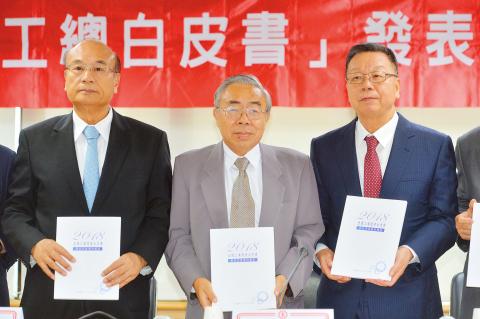The Chinese National Federation of Industries (CNFI, 工總) yesterday called on the government to value the nation’s manufacturing industry, as other sectors are not mature or big enough to drive economic growth.
“The US and China have sought to beef up their manufacturers in the pursuit of economic growth, but Taiwan is driving them away,” newly installed CNFI chairman William Wong (王文淵) said at the release of the trade group’s annual position paper.
Wong, also the chairman of the nation’s largest industrial conglomerate, Formosa Plastics Group (FPG, 台塑集團), expressed particular frustration over environmental, energy and labor regulations.

Photo: CNA
FPG, which primarily produces polyvinyl chloride (PVC) resins and other intermediate plastic products, has been blamed for poor air quality near its facilities and is waiting for regulatory approval of its capacity expansion plans.
US President Donald Trump has pledged to make the US great again by keeping manufacturing facilities onshore and Beijing has unveiled the “Made in China 2025” program, Wong said.
Bucking the trend, Taiwan has urged manufacturers to expand overseas, especially in Southeast Asia, to take advantage of cheaper land and labor costs there, Wong said.
He questioned the wisdom of the New Southbound Policy, as the government has not yet secured fair taxation, investment or personal safety protection pacts with countries in the region.
The trade group, which consists of 159 member associations and represents a majority of local manufacturing businesses, again pressed the government to push back the schedule of making the nation nuclear free from 2025 to 2050.
Renewable energy is not a reliable source and gas is not more environmentally friendly than coal, Wong said, adding that it would cost less to invest in reducing coal-related pollutants.
In any case, the nation needs more time to develop renewables and it is too risky to phase out nuclear power prematurely, with 120 short circuits reported so far this year, the group said.
A persistent lack of stable electricity, water, land, labor and talent supply has dampened investment interest in Taiwan, it said.
Wong said the government should refrain from unnecessary interventions in the labor market, adding that supply and demand would work out an equitable wage level for workers.
The average wage at FPG is NT$55,000 per month — much higher than the basic wage, Wong said.
Like the US and China, the government should create a more friendly environment for the manufacturing industry, which has underpinned GDP growth over the years, because agriculture and other sectors are too small to sustain the economy, he said.

GROWING OWINGS: While Luxembourg and China swapped the top three spots, the US continued to be the largest exposure for Taiwan for the 41st consecutive quarter The US remained the largest debtor nation to Taiwan’s banking sector for the 41st consecutive quarter at the end of September, after local banks’ exposure to the US market rose more than 2 percent from three months earlier, the central bank said. Exposure to the US increased to US$198.896 billion, up US$4.026 billion, or 2.07 percent, from US$194.87 billion in the previous quarter, data released by the central bank showed on Friday. Of the increase, about US$1.4 billion came from banks’ investments in securitized products and interbank loans in the US, while another US$2.6 billion stemmed from trust assets, including mutual funds,

Micron Memory Taiwan Co (台灣美光), a subsidiary of US memorychip maker Micron Technology Inc, has been granted a NT$4.7 billion (US$149.5 million) subsidy under the Ministry of Economic Affairs A+ Corporate Innovation and R&D Enhancement program, the ministry said yesterday. The US memorychip maker’s program aims to back the development of high-performance and high-bandwidth memory chips with a total budget of NT$11.75 billion, the ministry said. Aside from the government funding, Micron is to inject the remaining investment of NT$7.06 billion as the company applied to participate the government’s Global Innovation Partnership Program to deepen technology cooperation, a ministry official told the

Taiwan Semiconductor Manufacturing Co (TSMC, 台積電), the world’s leading advanced chipmaker, officially began volume production of its 2-nanometer chips in the fourth quarter of this year, according to a recent update on the company’s Web site. The low-key announcement confirms that TSMC, the go-to chipmaker for artificial intelligence (AI) hardware providers Nvidia Corp and iPhone maker Apple Inc, met its original roadmap for the next-generation technology. Production is currently centered at Fab 22 in Kaohsiung, utilizing the company’s first-generation nanosheet transistor technology. The new architecture achieves “full-node strides in performance and power consumption,” TSMC said. The company described the 2nm process as

JOINT EFFORTS: MediaTek would partner with Denso to develop custom chips to support the car-part specialist company’s driver-assist systems in an expanding market MediaTek Inc (聯發科), the world’s largest mobile phone chip designer, yesterday said it is working closely with Japan’s Denso Corp to build a custom automotive system-on-chip (SoC) solution tailored for advanced driver-assistance systems and cockpit systems, adding another customer to its new application-specific IC (ASIC) business. This effort merges Denso’s automotive-grade safety expertise and deep vehicle integration with MediaTek’s technologies cultivated through the development of Media- Tek’s Dimensity AX, leveraging efficient, high-performance SoCs and artificial intelligence (AI) capabilities to offer a scalable, production-ready platform for next-generation driver assistance, the company said in a statement yesterday. “Through this collaboration, we are bringing two